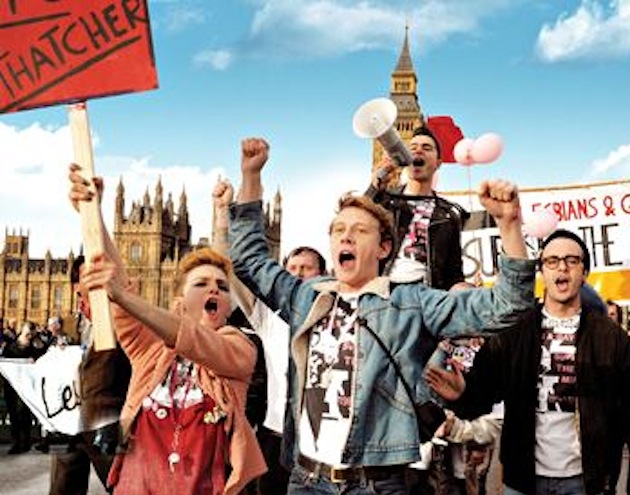Fuse Film Review: “Pride” — A Feel-Good Film About the Union Ties That Bind
Pride is poignant celebration of the power of the human element, a carefully layered tale of solidarity.
Pride directed by Matthew Warchus. Written by Stephen Beresford. At the Kendall Square Cinema, Coolidge Corner Theatre, and other screens around New England.
By Robert Israel
Some movies make use of a myriad of creative and technical elements to visually and aurally mesmerize us. Other films utilize less assaultive methods to sneak under our skins and then lodge themselves in our minds and memorizes. They may not necessarily be quieter, or less technologically advanced, but they captivate us in by sharing surprising stories of real people that mirror our own struggles and triumphs. Pride is a terrific example of a film that fits into the latter category: it is poignant celebration of the power of the human element.
Pride is crafted as a slowly unfolding, carefully layered tale of empowerment. It dramatizes the consanguineous bonds that develop between two disparate, disparaged groups that unite in a struggle to assert their dignity in a world that callously denies them respect. Based on real events, the film is set in London and Wales during the reign of “Iron Lady” Prime Minister Margaret Thatcher. We meet the striking members of the National Union of Mineworkers, an organization that Thatcher is hell-bent on busting, and a ragtag group of gay and lesbian activists, who call a crowded Bloomsbury bookshop their home. It’s the mid-1980s, just before the AIDS crisis began to rage in the United Kingdom and elsewhere.
The film opens as members of the gay group react to graphic televised images of the striking workers being bruised and battered by truncheon-wielding police. They understand this horrific treatment by the authorities all too well; throughout much of the 20th century homosexuality in the United Kingdom was considered a crime. Police frequently raided bathhouses and pubs, while the general populace looked upon gays as deviants.
So the homosexuals in the group mobilize, take to the streets and, armed with empty wash buckets, aggressively solicit for funds. Their rallying cry of solidarity for the miners works: the shillings and pound notes add up. But how do they get the money to the miners? Every time they reach out to contact the unions via telephone their calls are rudely terminated.
Persistence wins out: they finally connect with a union group in hardscrabble and desolate Wales, many hours and miles away from London. One of their Welsh miners, Dai (Paddy Considine) gratefully accepts their funds and, unfazed by the obvious differences in their lifestyles, agrees to speak publicly and thank them at a gay pub in London. It’s a chilly reception at first, but Dai melts the ice. He invites the members of the group to join him and the other miners in Wales.
The script jostles back and forth between the two locales and the colorful folk who live in both places. We meet Joe (George MacKay), a 20-year-old closeted gay man who sneaks out of his parents’s suburban home to join his mates; Hefina (Imelda Stanton) a plain-speaking volunteer at the Welsh union hall who helps to break down prejudices on both sides; and Cliff (Bill Nighy), a closeted Welsh gay man who finally “comes out” during the course of the film.
There are uproarious scenes of disco dancing at the union hall, sleepovers at the homes of the Welsh families, scuffles and tender embraces, all paced masterfully and beautifully acted throughout the film. If you’re not won over by the Welsh ladies serving white bread sandwiches and pints of bitters while singing union hymns, you’ll be pulled in by the rock-music filled scenes at the gay bar that end up filling the miners’ coffers beyond their expectations.
Ultimately, Pride is a feel-good film about the ties that bind, about human beings overcoming the exaggerated fears generated by perceived differences. There are a number of valuable lessons to be learned from this film, but the principle takeaway is what it teaches us about the solidarity that persecution inspires among the oppressed.
Robert Israel writes about theater, travel and the arts, and is a member of Independent Reviewers of New England (IRNE). He can be reached at risrael_97@yahoo.com
Tagged: homosexuality, labor union, Matthew Warchus, mineworkers, Pride

